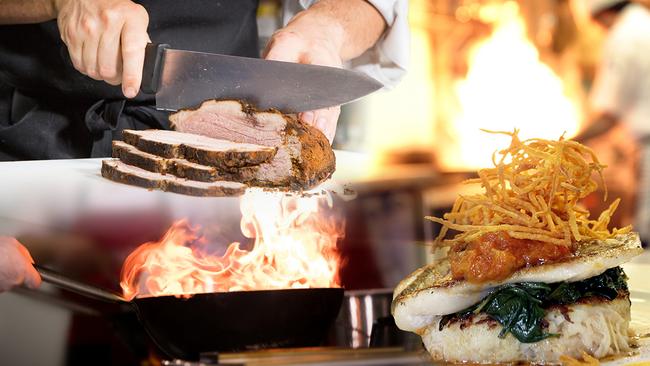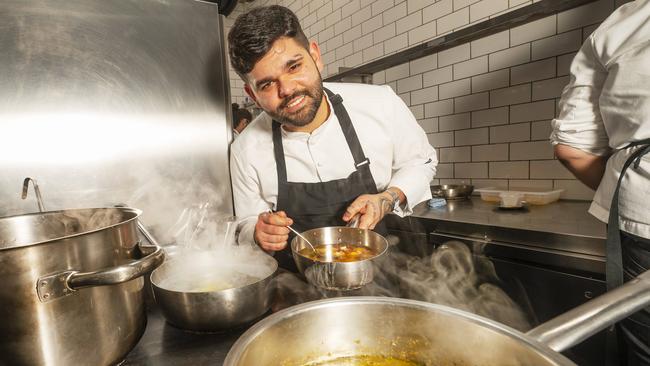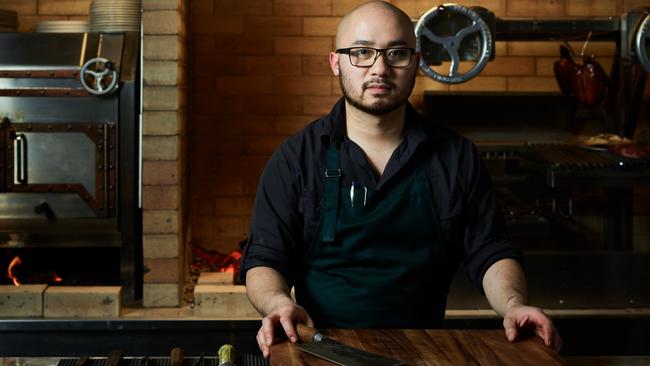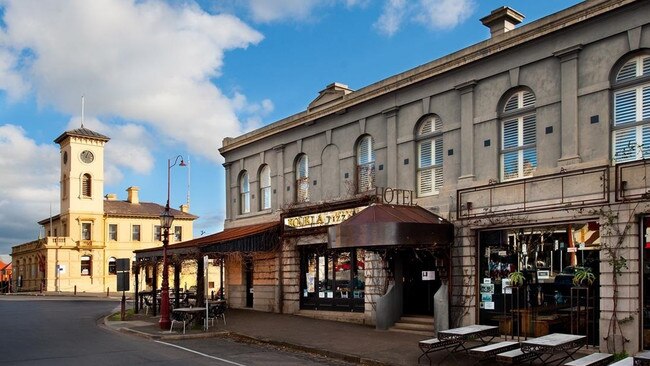‘I own you’: Horror stories emerge from Victorian restaurants
Chefs are being trained in as little as four months before being rapidly promoted amid staff shortages, leaving many “floundering, running a kitchen”, an insider claims.

News
Don't miss out on the headlines from News. Followed categories will be added to My News.
A chef on an overseas working visa was told by the owner of a well-known Victorian restaurant he could not take another job “because I own you”, in just one horrific case of bullying in the state’s hospitality sector this year.
Industry insiders have told the Herald Sun chronic staff shortages – leading to under-trained and inexperienced young chefs being quickly elevated to senior positions – and cost of living pressures had combined to turn some Victorian restaurant, cafe and function centre kitchens into toxic “pressure cookers” of stress and dysfunction.
President of Australian Institute of Technical Chefs, Sarah Maric, told the Herald Sun she had heard horror stories of bullying inside Victorian restaurants, with one recent case involving a young chef from overseas on a working visa.
Upon informing the owner of the well known restaurant he was leaving to take another job, was told he could not leave, “because I own you”, she said.
Ms Maric would not name the restaurant involved but said it occurred just a few months ago.
It comes after an unrelated claim of a toxic culture at South Melbourne fine dining restaurant Lûmé, that saw executive chef Diego Huerta Chabert quit over what he described as the “dark” and “unethical” side of the company he worked for.

“Over the course of my time here I’ve had the privilege of working alongside many talented, good people … however, the negative side of this company is too dark to fade away with the successes that we’ve achieved,” he said.
“It has deeply upset me to witness the unethical behaviour exhibited by the owner towards current staff, suppliers, friends and former colleagues.”
Mr Chabert’s shock departure came just days after top chef Khanh Nguyen sensationally stepped away from his award-winning restaurants Sunda, Aru and soon-to-open Antara 128, dismissing online claims that he had cultivated a toxic workplace culture.
Training shortcuts creating hell’s kitchen
Ms Maric said the Victorian hospitality industry was facing a crisis.
A chronic worker shortage was seeing young chefs with minimal training and experience catapulted through the ranks to positions of responsibility and extraordinary stress at some venues, where they were “left floundering and running a kitchen”, she said.
Instead of chefs working their way up through the apprenticeship system over three or four years, “which most chefs will tell you is the best way”, they were now being turned out by TAFEs and private Registered Training Providers in months, with no solid grounding in real, busy restaurants or hospitality venues, Ms Maric said.
“An apprentice used to spend time with every single person in the brigade … to get an understanding of what happens in each section. That’s been taken away now. So what we’ve got is a young person who walks out of TAFE with a certificate three or four depending on whether it’s a private RTO or a professional organisation — and the private RTOs are running them through a lot faster, sometimes in as little as four to six months — but they’re being paid as a qualified chef. They are put in a pressure cooker situation and struggling,” she said.

“It’s a tough place to be already, and then they’re pushed up through the ranks more quickly than they should be into administrative roles that they’re nowhere near prepared for … and they’re stressed, overwhelmed, exhausted and in a situation where they’re not coping.”
It took up to 10 years “of nurturing and development” for a chef to be properly prepared to work in a senior role, overseeing restaurant administration, staff and budgets as well as cooking proficiently, Ms Maric said.
Restaurant and Catering Australia chief Suresh Manickam said it was true that cost of living pressures and staff shortages were combining to place hospitality venue owners under stress, with most “performing a juggling act” to get by.
But it was his belief the industry “predominantly has a healthy culture”, with seasoned, good operators at the helm of most establishments.
“Of course any sector has some bad eggs that may not be the greatest example for whatever reason but I would not want to focus on those outliers but rather highlight the fact that, overwhelmingly I think, it’s an industry that supports a good working culture," Mr Manickam said.
However, he said workplace standards had changed over time and what was once possibly common practice in some restaurant kitchens was no longer acceptable in a modern workplace.
“So I think we all need to be mindful of those evolutions as they are in terms of cultural norms, behaviours and the like, and call them out (when they are wrong) — but in a way that does not denigrate people — in a positive and helpful way,” he said.
WorkSafe, FairWork cracks down
“Comprehensive investigations” have been launched by WorkSafe into four Victorian food and beverage providers, with another three being prosecuted.
Hundreds more of the state’s hospitality providers have been hit with compliance notices over health and safety concerns, workplace incidents and injuries, and return to work matters, following nearly 2000 inspections by the workplace watchdog in the past two years.
Among the WorkSafe prosecutions, a director aged in his 50s, a worker aged in his 20s and two companies have been charged following allegations of sexual harassment and bullying of young workers at hospitality outlets at two Melbourne hospitals.
It’s alleged seven workers, aged as young as 14, were sexually harassed by their boss and an older worker.
The matter is scheduled for a committal mention on July 18.
A WorkSafe spokesman said between July 1, 2021 and June 30 this year inspectors had conducted 1,844 visits to food and beverage providers, issuing 424 compliance notices.
“WorkSafe has commenced comprehensive investigations relating to four matters and has commenced prosecutions relating to a further three matters in the food and beverage services sector,” he said.
“Victorian employers, including those in the hospitality industry, must take every reasonable step to protect both the physical and mental health of workers. WorkSafe can and will take enforcement action when employers do not meet their obligations.”
The food and beverage services sector includes cafes, restaurants, takeaway food services, pubs, taverns, bars, catering services and clubs.
If WorkSafe inspectors believe there is evidence of a contravention or an immediate risk to worker health and safety immediate enforcement action can be taken. This can include anything from issuing improvement or prohibition notices to recommending a comprehensive investigation that can result in legal action.
A Fair Work Ombudsman (FWO) spokeswoman said “persistent high levels of noncompliance” to proper pay and conditions had been observed in the food industry by the national workplace regulator, with a shocking 83 per cent (or 177) of the 213 restaurants, cafes and fast food outlets audited across Australia in the 2021-22 financial year failing to do the right thing.
Ombudsman Sandra Parker said improving compliance in the hospitality sector and protecting vulnerable workers, including young people and migrants, were high priorities and businesses could expect to be hauled before the courts if they failed to comply with laws.
“Where employers do not comply, we will take appropriate action to protect employees. A court can order a business to pay penalties in addition to back paying workers,” Ms Parker said.
Fair Work Ombudsman action taken against:
• The operators and company director of former Stawell restaurant Lillies and Lattes for allegedly failing to properly pay a cook, who had come from Sri Lanka on a student visa.
• The former operators of a Gami Chicken & Beer outlet in Melbourne’s south east. Facing court are Vanna Taing and Brandon Bui, who formerly operated the ‘Gami-Southland’ outlet at the Westfield SouthlandShopping Centre in Cheltenham, and Gary Lai, who performed a human resources role for the business. It’s alleged workers including two young people, aged 17 at the time, and a number of visa holders, including workers from Vietnam and Korea were underpaid minimum wages, penalty rates, casual loadings, annual leave entitlements and payment-in-lieu-of-notice-of-termination entitlement.

• Theoperators of Daylesford Hotel Frangos and Cafe Koukla after 97 staff were allegedly underpaid a total of $320,929. The allegedly underpaid workers included 15 juniors, aged between 15 and 20 at the time, and a number of visa holders from countries including Nepal, Pakistan and Armenia.
• Theformer operators of a Degraves Streetcafe in Melbourne’s CBD, formerly trading as RMB cafe. Fair Work won more than $42,000 in court penalties and back pay for workers.
• The former operators of a Melbourne juice and coffee bar and a director, after they kept more than $14,000 in JobKeeper payments instead of paying them to an employee. The Federal Circuit and Family Court imposed a $26,640 penalty against Rika Foods North Melbourne, which operated a juice and coffee bar located inside the Sonsa Markets in Collingwood, and a $5,328 penalty against company director Radomir Pantovic.
• Theformer franchisee of the Coffee Club outlet at the Westfield Geelong shopping centre. The ombudsman secured $115,603 in penalties in court against the former operators of the outlet after finding they deliberately underpaid two young workers and falsified records.
Do you know more about bullying and toxic culture inside the hospitality industry? Contact mandy.squires@news.com.au




